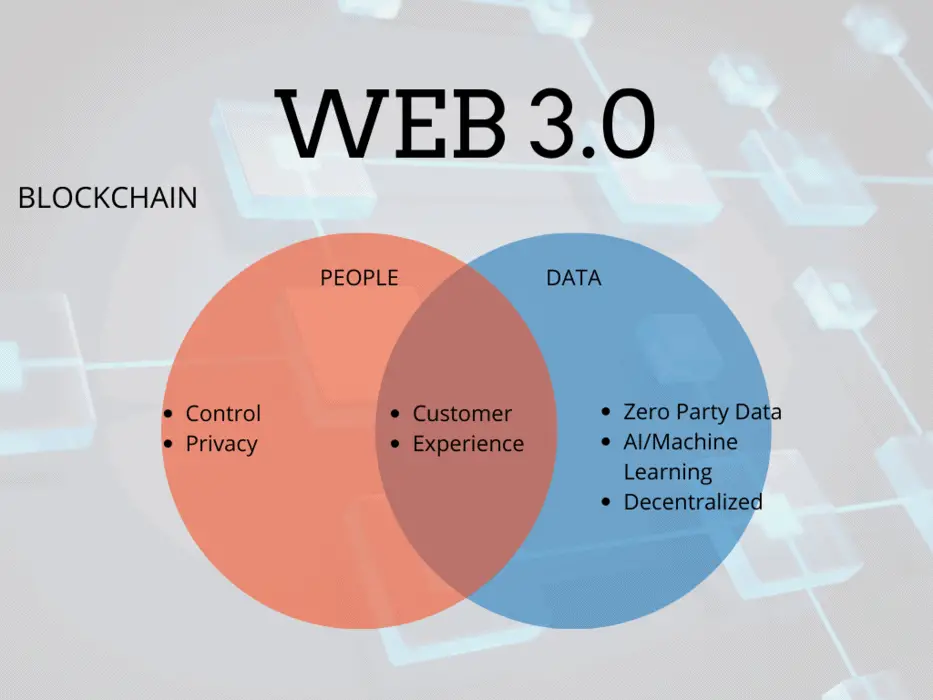Web 3.0 Marketing for Small Business
[ad_1]
Web 3.0 marketing is here. And, if you’re like me, it’s thrown you for a loop. Be warned, this is not a wait and see thing. If you don’t have Web 3.0 friendly marketing systems in place, your business will suffer.
If you were an adult or in business in the late 90’s or early 2000 people were wondering if you had to have a web site. Then around 2007 we were asking ourselves if social media was a fad.
And now, it’s time for Web 3.0. What do you think? Will Web 3.0 change small business marketing?
YES – your marketing will change (it already has)
No – Web 3.0 is not a fad. In fact, it’s been slowly entwining itself into your world and you don’t even know it.
This isn’t just another evolution of the internet; it’s a completely new way of thinking about and interacting online with far-reaching implications that will touch every corner of global society. In fact, in some ways, it’s already here.
Why do we need Web 3.0?
The great thing about the internet is that it makes it easy to give and get information and to conduct purchasing transactions online. The bad thing about the internet is that our personal data is vulnerable and we simply don’t like having our private information easily hacked.
To solve this problem, we have the Blockchain, a ginormous decentralized digital ledger where every transaction is duplicated and distributed. This makes it impossible to hack or change because the data isn’t owned by any central entity.
Web 3.0 will help us separate our private information from our online activity in such a way that we gain privacy while allowing us to do all the same things we did before.

You are Already Dealing With Web 3.0
I’ve been saying Web 3.0 is already here. You see, tech has been building an infrastructure for Web 3.0 for years already — because YOU have been asking for it.
Here are a few important elements of Web 3.0 that you’ve already been dealing with:
- GDPR: (General Data Protection Regulation): Requires any organization that collects personal data to protect that data.
- Cookies: Tracking cookies are used to gather information about you without your authorization, they present a real threat to your online privacy. Tracking cookies like third-party cookies aren’t used to enhance your experience but rather to keep track of your activity across certain websites.
- Apple iOS 14: This new security feature allowed users to opt out of being tracked. That means that your marketing data – everything from email opt ins to ad targeting is no longer targeted and will cost you MORE.
These definitely impact your marketing if you’re doing any advertising for lead generation. But, just like the internet, it’s going to become even more engrained in your ability to get and keep customers.
Web 3.0 is Personalization on Steroids
Personalization has been a major trend in how businesses engage with customers for years. It started with remembering your basic info such as your name, birthday and generate interests. But as consumers, we want MORE.
Websites now have the ability to understand and react to their users in a much more personal way. Websites are no longer static pages of information; they’re dynamic programs that learn about their users as time goes on and can respond accordingly.
In fact, both you and your customers don’t just visit a website anymore. Each visit triggers an AI-powered learning engine that will customize your online experience in the same way that you might wander through a mall or a library.
So how will Web 3.0 change small business marketing? Let’s take a look at how marketers will need to adapt if they want their business to thrive in this new era…
Consumer Empowerment
One of the most obvious effects of Web 3.0 is that it empowers consumers in a way that no previous iteration of the internet has ever done.
This is largely thanks to the shift in control that comes with moving from a centralized internet to a decentralized internet. On the centralized internet, user data is held on centralized servers. That means that it can be accessed, and possibly exploited, by any organization that has control over those servers. And that’s a lot of organizations, given that the centralized internet is dominated by a small handful of companies.
This centralized approach to data is what has led to the current situation, in which consumers feel as though their data has been exploited, and businesses feel as though they have to collect as much data as possible in order to compete. This has led to a massive breach of trust between consumers and businesses, and has led many people to assume that the centralized internet must be replaced with a decentralized alternative.
Data Transparency and User Control
Web 3.0 will bring about the end of hidden data, and therefore the end of hidden algorithms.
Currently, some companies do not share their core algorithms with the world at large, claiming that they know their business better than anyone else. This leads to a situation in which a company’s product might be extremely effective, but no one knows why it’s so effective.
The result is a lot of confusion, and an increased chance that a competitor will be able to replicate a product’s effectiveness.
This will all change with Web 3.0.
A decentralized business model empowers users to gain more control over their data. It also empowers them to demand the ability to see how that data is used, including any decisions made by algorithms.
The result is that businesses will no longer be able to hide their data use — they’ll have to share it. In turn, businesses will be able to collect more meaningful data, as customers will be more willing to share information if they know that it’s going to be used for their benefit as well as for the benefit of the business.
User Data Ownership Will Be Required
The results are in — users want to own their data. We know this because of Apple’s iOS 14 release and the massive number of users who have stopped sharing their data. This means that if you don’t have a way for users to freely give or not give their data, your marketing will be much more expensive and you can expect to target customers and measure results.
So how will marketers get data directly from customers?
Some people have suggested that organizations should be able to buy data from their customers in exchange for a monetary reward, this is unlikely to gain much traction.
Instead, it seems more likely that the decentralized internet will adopt a model of data ownership, in which customers will have exclusive control over their data. That way, they can choose whether they want to share their data with organizations, and they can put a monetary value on how much they’re willing to share. Blendr, a dating app, has already implemented this model, allowing users to collect tokens whenever another user takes a look at their data. They can then use those tokens to decide whether they want to share their information with other users.
Digital Advertising Will Be Driven by AI
One of the most obvious ways in which Web 3.0 will change the way we advertise is by making it more personalized. This is something that centralized organizations have been trying to do for a long time, with varying degrees of success.
Despite the best efforts of centralized organizations, though, it has proven difficult for them to deliver ads that are relevant to each particular user. That’s largely because centralized organizations have to rely on cookies and other trackers to collect data, which makes it difficult to identify a specific user from one moment to the next.
With decentralized data, it will be much easier for decentralized organizations to create personalized ads that are relevant to each user.
Blockchain and the Demise of Ad-Based Marketing
Another obvious way in which Web 3.0 will change the way that marketers do business is by making ad-based marketing completely redundant.
This method of generating revenue has been a significant part of the internet’s business model for decades, but it will almost certainly die out in the decentralized internet.
This is because the decentralized internet places a high value on user privacy, and ad-blocking software is expected to become more and more prevalent as the years go on. This trend toward ad blocking is already evident, with more than one billion people using ad blocking software. As decentralized browsers become more prevalent, this trend is likely to accelerate.
Digital Marketplaces Will Rule
One of the most fundamental ways in which Web 3.0 will change the way that people buy and sell goods is by creating digital marketplaces that dominate their sectors.
Digital marketplaces are websites that allow people to buy and sell goods with each other, and they’ve already proved highly lucrative.
One of the most successful digital marketplaces is Airbnb, which allows people to rent out rooms in their houses to people looking for a place to stay. Airbnb has turned into a $30 billion business, and it shows no signs of slowing down.
Other marketplaces such as Etsy and Amazon’s Handmade marketplace are also doing extremely well, and they’re likely to get even bigger as Web 3.0 progresses.
As the decentralized internet becomes more popular, the marketplaces that it spawns will become increasingly decentralized as well. This will result in higher security for both buyers and sellers, and will also drastically reduce overhead costs for businesses.
Real-Time Marketing
One of the most significant changes that Web 3.0 will bring about is a change in the speed of business.
As the world moves toward a more decentralized internet, real-time communication will become far more important than it is now. In fact, it’s likely that businesses will be expected to respond to their customers almost instantly.
This will be especially true in the case of AI-powered digital agents, which will be able to purchase goods from businesses while the customers are in the moment. This will mean that businesses will need to be able to communicate with customers instantly, and that they’ll need a way to track their customer’s digital agents.
Summing up
Web 3.0 isn’t just an evolution of the internet — it’s a completely new way of thinking about and using it. It has the potential to change the way we market to customers forever, and businesses need to be ready to adapt if they want their business to thrive in this new era.
[ad_2]
Source link








